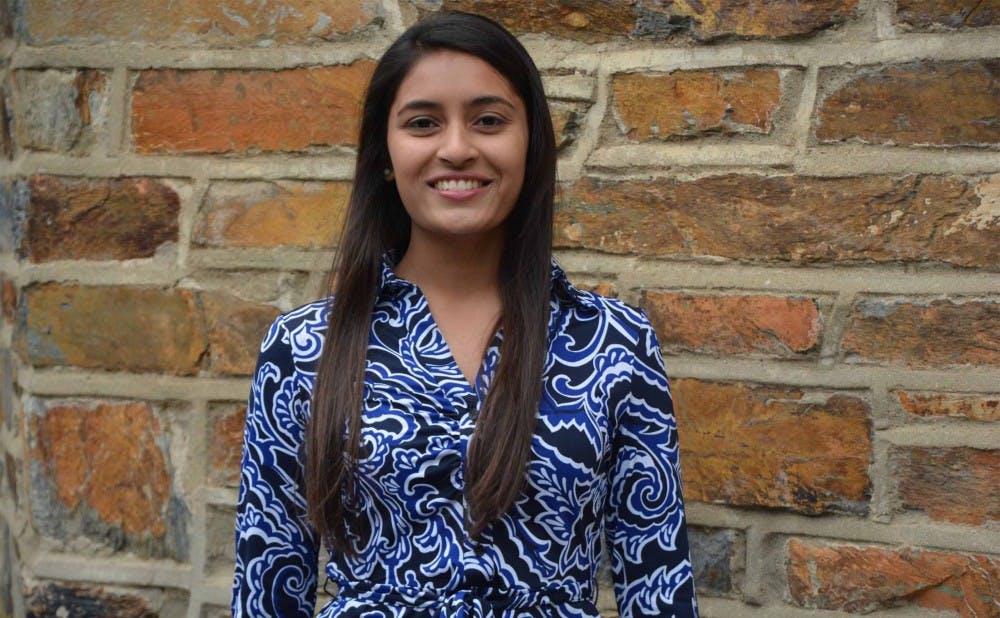Next Tuesday, the student body will elect a new Duke Student Government president, executive vice president and Student Organization and Funding Committee chair. The Chronicle's Aleena Karediya sat down with SOFC chair candidate Apara Sivaraman, a sophomore, to discuss her goals for SOFC and her personal experience.
The Chronicle: Why are you interested in becoming SOFC chair?
Apara Sivaraman: I’ve been on SOFC for two years now. I joined freshmen year, and in that time I’ve gained a position on the executive board of SOFC. I’d say the issue that got me most involved with SOFC was the 40 Percent Plan. I spent a lot of time in advocating against it and trying to bring light to the situation. I created a transparency survey and made sure that people were well aware of what it entailed. After working on the 40 Percent Plan, I realized how big of an impact SOFC has on every single student group and every single student on campus, and I want to bridge the gap between student groups and funding to the best of my ability.
TC: What do you feel qualifies for you for the role?
AP: I think that the biggest thing that the SOFC needs to be a successful and qualified chair is knowledge of all the student groups on campus, the bylaws of SOFC and the ins and outs of the committee itself. Additionally, it needs to be someone always present at meetings, on time and engaged. I think I’ve done that to the best of my ability. I’ve been to every meeting this year except one, and I’ve listened carefully to the requests of each student group to know who they are, what they want to achieve and how best to allocate student funds to them. It’s something that I’m very invested in. I know all the bylaws and committee members very well, so I feel that there won’t be much of a learning curve for me as I take on the role.
Additionally, the chair needs to be a liaison to the senate, because they are the one to directly communicate with the senate during meetings. I’ve had experience in representing SOFC and the new student groups at meetings when the chair couldn’t make it once this year, and I can envision myself acting in that role next year.
TC: How do you think the role of the SOFC committee has changed since last year, which was the first year that the chair was elected by the student body?
AP: I don’t think the role of the SOFC chair has changed that much. The chair still runs meetings and facilitate good discussions on allocation of funds, to make sure that it’s fair and that group are getting what they want.
I do think, however, that the committee itself is evolving and regrouping. There’s a lot of stuff we are working on to make sure that students know where their funds are going. For example, this year, we have weekly SOFC blasts that go out to all members of the student population. I think this is a great way to uphold some of the bylaws of SOFC that state that that group events funded by SOFC must be free and available to all students.
Additionally, this year the chair is piloting a program to streamline how we send out funding application. This would be an online system, as opposed to the Google Doc system that used to have in place. All of the annual budget requests this year will be sent in online, and groups will get real-time updates on the processing of these requests. The chair has set a great example for things that I will need to undertake next year for the programming fund. I think the way the committee runs is essential to student satisfaction in fund allocation.
TC: How do you see the relationship between the chair and the student body in the year since it has been an elected position?
AP: Transparency is one of my goals for next year. Once elected, I want to make sure that the student body is totally aware of what SOFC is, how it operates and how exactly it deals with student funding. I know that right now, many students are unclear as to the role that SOFC plays in DSG. I’m glad that the role of SOFC chair has switched over to being a student elected position. This will hopefully encourage students to do their research into SOFC and what its purpose is on campus.
I also think that the relationship is a little complicated in part because you really have to be present in the board room to see which [SOFC] candidate is engaged, knowledgeable, and present at all times. It’s a little hard to see that just by seeing names on a ballot. Hopefully, students can make informed decisions on the election based on what the three candidates present through interviews or candidates.
TC: What do you think students should know about SOFC and how it works?
AP: I think that SOFC is a little bit different than the other DSG elected positions, like president, because SOFC carries more of an internal position instead of external. It’s much more important that a person be passionate about SOFC and work hard, because of SOFC’s huge task of allocation. I really want to urge students to choose candidates based on how candidates interact with SOFC and what they have done to further SOFC’s goals rather than personal knowledge of a person because it can ultimately play a huge role in how their money gets spent.
Get The Chronicle straight to your inbox
Signup for our weekly newsletter. Cancel at any time.

